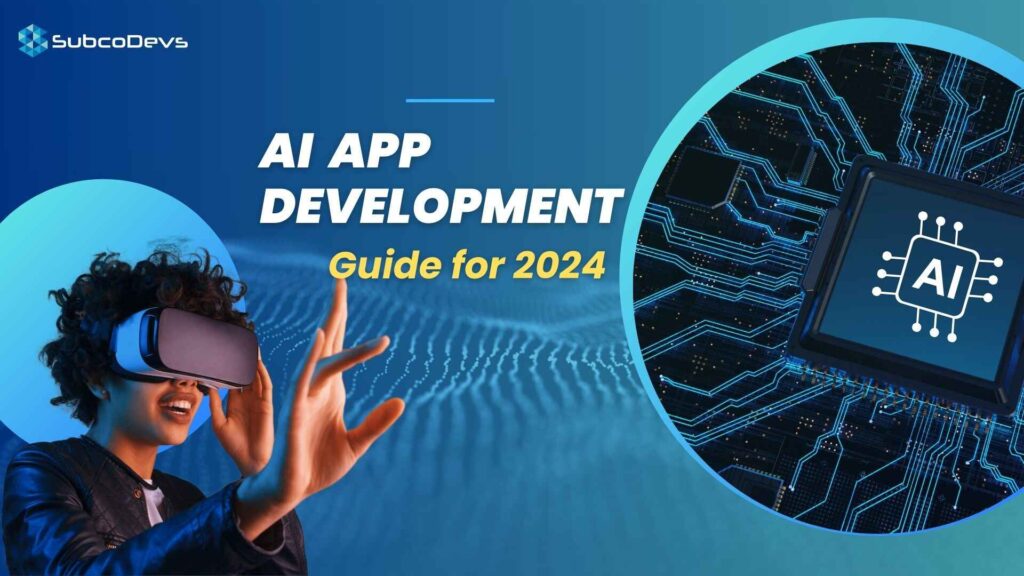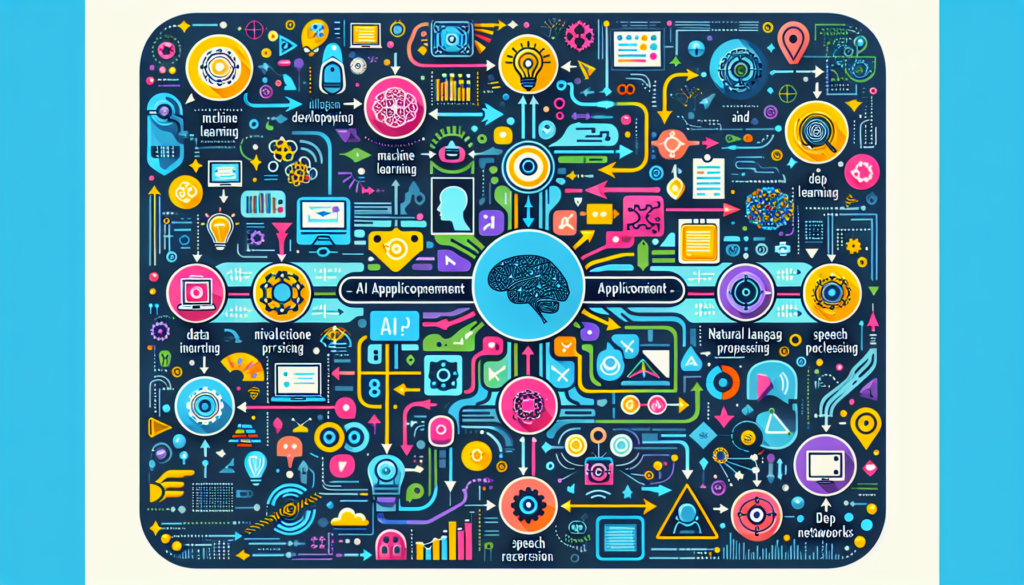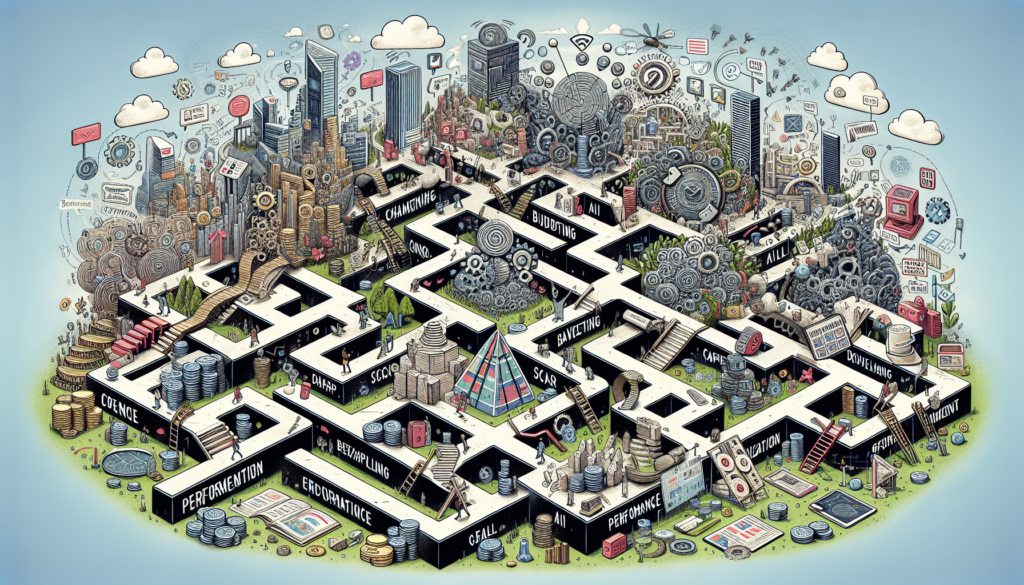AI app development creates mobile apps using artificial intelligence to automate tasks and enhance user experiences. It’s crucial today as it transforms how we interact with technology. This guide covers key technologies, challenges, and steps to build AI apps in 2024. Additionally, we will explore various ai app development tools that can streamline the process.
Key Takeaways
- The AI market is rapidly expanding, enhancing mobile app development through automation, personalization, and advanced functionalities.
- Key technologies like machine learning, natural language processing, computer vision, and ai app development tools are essential for creating smarter, user-centric AI apps.
- Choosing the right development partner and addressing budgeting and resource challenges are crucial for successful AI app projects.
Understanding AI App Development
The global AI market has seen explosive growth, with projections indicating it could soar to around $1,597.1 billion by 2030. This surge is largely due to AI’s transformative impact on mobile app development, automating tasks, enhancing user experiences, and enabling advanced functionalities that were once the stuff of science fiction.
AI integration in mobile apps is rapidly reshaping user experiences across various industries, making them more intuitive, user-centric, and capable of learning from interactions. For instance, AI-powered apps can now offer personalized recommendations, intelligent responses, and even predictive insights, making them indispensable tools in our daily lives.
Ai app development tools are essential components in the development process, enabling developers to create sophisticated and efficient AI-powered applications.
This guide will highlight the essentials of creating AI-powered applications, showcasing growth and innovation in this exciting field. It will cover key technologies and development challenges, providing a roadmap to mastering AI app development.
Key Technologies in AI Application Development
AI app development relies on an array of sophisticated technologies that significantly boost the capabilities and efficiency of mobile applications. Understanding these technologies is crucial for anyone looking to create AI-powered apps, as they form the backbone of intelligent functionalities. Additionally, ai app development tools are an essential part of the technological landscape.
At the heart of AI application development are advanced technologies like:
- Machine learning
- Deep learning
- Natural language processing
- Computer vision
Each of these plays a unique role in enabling AI systems to learn, understand, and interact with users in more meaningful ways.
We will explore these key technologies in detail, explaining how they work and how they can be used to create smarter, more intuitive mobile apps. First, we will examine machine learning and deep learning, which drive AI’s ability to learn from data.
Machine Learning and Deep Learning
Machine learning (ML) and deep learning (DL) are the cornerstones of modern AI applications. Machine learning enables systems to learn from data patterns without needing explicit programming, while deep learning mimics human brain functions through neural networks. This ability to learn and improve over time makes ML and DL incredibly powerful tools in AI app development. Additionally, ai app development tools that support machine learning and deep learning are essential for creating advanced AI applications.
Machine learning algorithms enable apps to learn from user behavior, enhancing their intuitiveness and personalization. AI-powered mobile applications utilize these algorithms to provide features such as personalized recommendations and intelligent user interactions.
A prominent example of deep learning in action is the use of chatbots. These AI-driven virtual assistants are expected to become standard features in mobile apps, significantly enhancing customer service and user interaction by providing real-time, intelligent responses.
Natural Language Processing
Natural language processing (NLP) is another critical technology in AI app development, enhancing user interactions by allowing applications to understand and respond to human language effectively. NLP enables apps to interpret and respond to user queries in a conversational manner, which significantly boosts customer service and user engagement. AI app development tools that facilitate natural language processing are essential for creating these advanced capabilities.
Picture an app that comprehends your commands as naturally as a human would. NLP can perform tasks like summarizing text, generating audio, and sentiment analysis, making user interactions more seamless and intuitive.
In 2024, the integration of AI-driven features like image recognition and sentiment analysis in apps is expected to become increasingly common, further enhancing the capabilities of AI-powered mobile applications.
Computer Vision and Image Recognition
Computer vision plays a crucial role in enabling applications to interpret visual data, thereby enhancing user experiences through visual understanding. This technology allows apps to analyze images and videos, making interactions more intuitive and engaging. AI app development tools that support computer vision and image recognition are essential for building these advanced applications.
For example, computer vision can be used in mobile apps for functionalities like facial recognition, barcode scanning, and augmented reality, which improve user interactions by providing more immersive and interactive experiences.
As we move forward, the integration of computer vision technologies in AI apps is expected to grow, making apps smarter and more responsive to visual inputs.
Choosing the Right AI App Development Company
Selecting the right AI app development company is a critical step in bringing your AI-powered app idea to life. The first step is to clearly define your project’s objectives, ensuring that the development company aligns with your vision and goals. This alignment sets the foundation for a successful collaboration and project outcome. Additionally, consider the ai app development tools they use as a criterion for selecting the right development company.
Assess potential companies by reviewing their past projects and client testimonials. This research gauges their proficiency and reliability in delivering AI solutions. Online directories and review platforms offer valuable insights into the reputation of AI development companies.
Finally, ensure that the chosen company possesses proficiency in the relevant AI technologies suited for your specific project needs. This includes not only technical skills but also an understanding of the industry-specific challenges your app aims to address. With the right partner, your AI app development journey can be smooth and successful.
Building AI Powered Mobile Apps
Building AI-powered mobile apps involves leveraging AI technologies to create smarter and more intuitive applications that meet user demands. The rise of AI applications is driven by the need for personalized user experiences, efficiency, and automation. Additionally, using ai app development tools can significantly streamline the development process.
Machine learning algorithms personalize experiences by enabling apps to learn from user behavior. Natural language processing allows AI-powered apps to understand and respond to user queries, ensuring seamless interactions.
However, integrating AI capabilities into mobile applications also requires a thoughtful approach to data security and ethical use of AI technology. Robust security measures are vital to protect user data and maintain trust.
Leveraging AI Tools and AI App Builders
Leveraging AI tools and app builders is essential for efficient AI mobile app development. These tools are pivotal for building and training AI models in mobile applications. They provide the necessary infrastructure for developing sophisticated AI functionalities.
Additionally, platforms like Softr, Microsoft PowerApps, and Google AppSheet enable rapid app generation and real-time editing, making it easier to create apps and modify android apps quickly based on user prompts and existing data. These tools streamline the development process, allowing developers to deploy apps faster and more efficiently. AI app development tools are also part of this comprehensive toolkit for developers.
Using this generative ai app builder, ai app developers can implement innovative features and improve user experiences with a no code app builder, without getting bogged down by complex coding.
Integrating AI Capabilities
Integrating AI capabilities into mobile apps enhances their functionality, leading to smarter and more personalized user experiences. Machine learning and deep learning enable apps to provide features like personalization, predictive analysis, and improved security. AI app development tools facilitate the integration of these AI capabilities.
Deep learning uses neural networks with multiple layers to recognize patterns in large datasets, facilitating advanced features such as facial recognition. Natural language processing can offer conversational experiences through chatbots and sentiment analysis, making apps more engaging and interactive.
Image recognition technologies enhance user interaction by enabling functionalities such as barcode scanning and facial identification. Predictive analytics will become more mainstream in mobile app development, enabling apps to offer tailored recommendations and improve the user interface.
Advanced techniques like reinforcement learning let AI models enhance their decision-making in real-time within mobile apps. AI app builders can speed up the development process by offering pre-built functionalities and templates, simplifying the integration of AI capabilities.
Ensuring Robust Security Measures
Robust security measures are crucial when developing AI-powered mobile apps. Verify that the development company adheres to data security standards and compliance regulations to protect sensitive information. Adherence maintains user trust and complies with legal requirements. Utilizing ai app development tools that enhance security measures can further strengthen the protection of sensitive data.
Implementing robust authentication and access controls is also vital for safeguarding AI applications against unauthorized access. Continuous monitoring of AI applications helps identify vulnerabilities and maintain a secure environment for user data, ensuring that the app remains safe and reliable.
Overcoming Challenges in AI App Development
AI app development is not without its challenges. Budgeting and resource allocation are often significant hurdles, requiring strategic planning to ensure project timelines and costs are managed effectively. These challenges can impact the overall success of the project if not addressed properly. Utilizing ai app development tools can help address these development challenges.
Effective communication and collaboration among team members are equally crucial. Team dynamics play a significant role in the development process, necessitating seamless collaboration to tackle obstacles and ensure smooth project execution.
Scaling and performance optimization present additional challenges, requiring careful consideration of architecture and performance strategies to maintain responsiveness under varying loads. Implementing these strategies is essential for building scalable, high-performance AI applications.
Budgeting and Resource Allocation
Budgeting in AI app development requires meticulous planning. Effective resource management includes assessing the project scope and aligning budgets to avoid overspending. This involves a comprehensive cost breakdown that accounts for both direct and indirect expenses related to AI development. AI app development tools can help manage resources effectively.
Adopting Agile methodologies can control costs by fostering iterative development and early problem identification. This approach allows for continuous adjustments and improvements, saving money and ensuring the project stays within budget.
Strategic budgeting and resource allocation mitigate financial risks and ensure the successful completion of AI app development projects.
Communication and Collaboration
Effective communication is crucial in the dynamic world of software development. Assessing a company’s communication effectiveness ensures timely updates and seamless collaboration. Strong communication channels among developers, designers, and stakeholders align project goals and foster teamwork. Additionally, utilizing ai app development tools can significantly facilitate team collaboration.
Regular communication with the development team is crucial to track project status and prevent delays. Evaluate previous clients’ feedback to gain insights into the company’s communication, collaboration, and overall performance.
Strong collaboration among developers enhances problem-solving abilities and innovation, ultimately contributing to the project’s success.
Scaling and Performance Optimization
Scalable AI applications require careful consideration of architecture and performance strategies to ensure responsiveness under varying loads. Horizontal scaling, which involves deploying applications across multiple servers, enhances fault tolerance and resource utilization. Additionally, using ai app development tools can significantly enhance performance and scalability.
Container orchestration platforms efficiently manage applications and can automatically adjust resources based on demand. Implementing caching improves app performance by storing frequently used data and reducing server load during peak times.
Optimizing algorithms and efficiently managing computational resources are essential for building scalable AI applications. Fast and seamless user experiences are critical for achieving high-performance apps.
Future Trends in AI Mobile App Development
The AI mobile app development landscape is poised for significant transformation with emerging technologies and trends. For instance, the natural language processing (NLP) sector is rapidly expanding, with projections indicating it could grow from $27.73 billion in 2022 to $439.85 billion by 2030. AI app development tools will shape the future of AI app development.
The computer vision market, valued at $17.7 billion in 2023, is also expected to grow significantly, reaching $30.3 billion by 2030. These advancements will enhance user experience and engagement in mobile applications.
The integration of these advanced technologies, along with other emerging trends, will continue to drive innovation in AI mobile app development, offering new possibilities and opportunities for developers and businesses alike.
Summary
As we’ve explored, AI app development is a dynamic and rapidly evolving field, offering immense potential to transform mobile applications. By understanding the key technologies like machine learning, natural language processing, and computer vision, and by choosing the right development partners, businesses can create innovative and user-centric AI-powered apps. AI app development tools play a crucial role in this process, enabling developers to efficiently build and deploy sophisticated AI solutions.
The journey to building successful AI apps involves overcoming challenges related to budgeting, communication, and scaling, but the rewards are well worth the effort. With the future trends pointing towards even more advanced AI capabilities, now is the perfect time to harness the power of AI and revolutionize your mobile app development projects.
Frequently Asked Questions
What is one of the main challenges in software development projects?
One of the main challenges in software development projects is managing the budget effectively. Staying on top of your finances is crucial for keeping the project on track and ensuring its success!
What is crucial for the success of a software development project?
Choosing the right software development framework is essential for your project’s success. It can significantly impact development speed, scalability, and maintainability—so make that choice wisely!
What is the importance of communication in software development?
Effective communication is vital in software development as it ensures everyone is on the same page, fostering collaboration and reducing misunderstandings. Prioritize clear communication to enhance teamwork and drive successful projects!
What should businesses consider when developing a business app?
To create a successful business app, it’s essential to identify the right monetization strategy from the start. This will ensure your app not only attracts users but also generates revenue effectively.
What is a key factor in building scalable and high-performance apps?
To build scalable and high-performance apps, prioritize fast and seamless user experiences. This focus will ensure your app meets user demands and grows effectively.





